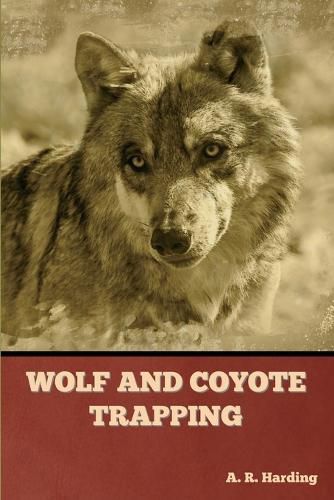Readings Newsletter
Become a Readings Member to make your shopping experience even easier.
Sign in or sign up for free!
You’re not far away from qualifying for FREE standard shipping within Australia
You’ve qualified for FREE standard shipping within Australia
The cart is loading…






This title is printed to order. This book may have been self-published. If so, we cannot guarantee the quality of the content. In the main most books will have gone through the editing process however some may not. We therefore suggest that you be aware of this before ordering this book. If in doubt check either the author or publisher’s details as we are unable to accept any returns unless they are faulty. Please contact us if you have any questions.
Arthur Robert Harding (July 1871 - 1930), better known as A. R. Harding, was an American outdoorsman and the founder of Hunter-Trader-Trapper and Fur-Fish-Game Magazine, and publisher, editor and author of many popular outdoor how-to books of the early 1900s. His company was known as the A. R. Harding Publishing Company of Columbus, Ohio and St. Louis, Missouri.
Harding’s books and magazines had an enormous impact on trapping, trap manufacturing, the fur trade, conservation and game laws.
Harding was one of the first national advocates of scientific wildlife management, conservation and good sportsmanship. In his articles, he called for a closed season on furbearers, at a time when many states allowed year-round trapping and hunting. He fought to make the game laws fair and consistent, and opposed the federal government’s use of poison to kill wolves and coyotes.
His books and articles on fur farming accelerated the industry’s potential. With the depletion of the beaver in Canada, the growing demand for fur articles, and the development of new dyeing techniques (which allowed mock furs to be made from cheaper pelts), the easily obtained, how-to information that Harding offered helped to quickly expand the home enterprise of raising furbearers. Harding’s motives for supporting this business were not entirely profit-driven: he believed that fur farming would help reduce the pressure on wild populations, which were being destroyed through habitat depletion, and save the furbearers from extinction. (wikipedia.org)
$9.00 standard shipping within Australia
FREE standard shipping within Australia for orders over $100.00
Express & International shipping calculated at checkout
This title is printed to order. This book may have been self-published. If so, we cannot guarantee the quality of the content. In the main most books will have gone through the editing process however some may not. We therefore suggest that you be aware of this before ordering this book. If in doubt check either the author or publisher’s details as we are unable to accept any returns unless they are faulty. Please contact us if you have any questions.
Arthur Robert Harding (July 1871 - 1930), better known as A. R. Harding, was an American outdoorsman and the founder of Hunter-Trader-Trapper and Fur-Fish-Game Magazine, and publisher, editor and author of many popular outdoor how-to books of the early 1900s. His company was known as the A. R. Harding Publishing Company of Columbus, Ohio and St. Louis, Missouri.
Harding’s books and magazines had an enormous impact on trapping, trap manufacturing, the fur trade, conservation and game laws.
Harding was one of the first national advocates of scientific wildlife management, conservation and good sportsmanship. In his articles, he called for a closed season on furbearers, at a time when many states allowed year-round trapping and hunting. He fought to make the game laws fair and consistent, and opposed the federal government’s use of poison to kill wolves and coyotes.
His books and articles on fur farming accelerated the industry’s potential. With the depletion of the beaver in Canada, the growing demand for fur articles, and the development of new dyeing techniques (which allowed mock furs to be made from cheaper pelts), the easily obtained, how-to information that Harding offered helped to quickly expand the home enterprise of raising furbearers. Harding’s motives for supporting this business were not entirely profit-driven: he believed that fur farming would help reduce the pressure on wild populations, which were being destroyed through habitat depletion, and save the furbearers from extinction. (wikipedia.org)